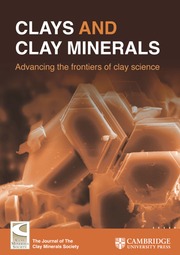Article contents
Scanning Electron Microscope Study of Bauxites of Different Ages and Origins
Published online by Cambridge University Press: 01 July 2024
Abstract
Sixty-five bauxite samples of different ages and origins were studied by scanning electron microscopy. Only broken surfaces of the specimens were investigated. Size and form of individual crystals and of grain aggregates were studied as were different types of microtextures and space-fillers.
Grain size varies from 0.05 μm to 1 mm. Smallest is the grain size of young karstic bauxite deposits that is explained by a physicochemical retardation effect of the carbonate environment. Significant differences were found by comparing the space-filling of karstic and lateritic bauxite deposits. High-level and low-level lateritic deposits show differences as well.
A combined use of macroscopic observations, petrographie microscopy, electron microprobe, SEM, and TЕM furnishes the best clues for any genetic interpretation of bauxites. SEM studies are useful in solving technological problems of bauxite processing.
Резюме
Шестьдесят пять образцов боксита разного возраста и происхождения были изучены развертывающим электронным микроскопом. Исследовались только разломанные поверхности образцов. Были изучены размеры и формы индивидуальных кристаллов и агрегатов зерен,также как различные типы микро-текстур и наполнителей межзернового пространства.
Размер зерен меняется от 0.05 ум до 1 мм. Наименьшими являются размеры зерен молодой карстовой залежи боксита,что объясняется физическо-химическим замедляющим эффектом карбонатной среды. Значительные различия были обнаружены при сравнении наполнителей межзернового пространства в бокситах карстовых и латеритовых залежей. Латеритовые залежи высокого и низкого уровней также обнаруживают различия.
Комбинированное использование макроскопических наблюдений,петрографической микроскопии,электронного микрозонда,РЕМ и ТЕМ обеспечивает наилучшие возможности для интерпретации генезиса бокситов. Исследования с помощью РЕМ полезны при решении технологических проблем обогащения бокситов.
Kurzreferat
Fünfundsechzig Bauxitproben, verschiedenen Alters und Abstammung, wurden mit “Scanning electron microscopy” (SEM) untersucht. Nur gebrochene Oberflächen der Proben wurden untersucht. Sowohl Größe und Formen einzelner Kristalle und Kern-Aggregate, wie auch verschiedene Typen von Mikrostrukturen und Füllmassen wurden untersucht. Körnchengröße schwankt von 0,05 um bis 1mm.Eine junge, karstische Bauxitablagerung hat das kleinste Körnchenausmaß, was auf einen physikalisch-chemischen Verzögerungseffekt der Karbonatumgebung zurückzuführen ist. Bedeutende Unterschiede wurden ent -deckt durch den Vergleich von Füllkapazitäten der karstischen und lateri-tischen Bauxitablagerungen. Hochliegende und niedrigliegende, lateritische Bauxitablagerungen zeigen auch Unterschiede. Die besten Anhaltspunkte für irgendwelche genetische Interpretationen von Bauxiten, wurden durch den ver -einigten Gebrauch von makroskopischen Beobachtungen, petographischer Mikroskopie, Elektronen-Mikrountersuchungen, SEM und TEM geliefert. SEM Unter suchungen können angewendet werden, um technologische Probleme der Bauxitbearbeitung zu lösen.
Résumé
Soixante-cinq échantillons de bauxite d’âges et d'origines différents ont été étudiés par microscopie électronique. Seules les surfaces cassées des spécimens ont été l'objet de recherches. La taille et la forme de cristaux individuels et d'aggrégats de grains ont été étudiées, de même que différentes sortes de micro-textures et d’éléments comblant les vides.
La taille des grains varie de 0.05 μm à 1mm. La graine de la plus petite taille est celle d'une jeune bauxite karstique, qui s'explique par un effet de retardation physiso-chimique du milieu ambiant carbonate. Des différences significatives ont été trouvées en comparant le comblement d'espaces de dépôts de bauxite karstiques et latéritiques. L'usage combiné d'observations macroscopiques, de microscopie petrographique, de microprobe électronique, de S.E.M. et de T.E.M. procurent les meilleurs indices pour une interprétation génétique de bauxites. Les études au microscope électronique aident à résoudre les problèmes technologiques du traitement de la bauxite.
- Type
- Research Article
- Information
- Copyright
- Copyright © 1978, The Clay Minerals Society
References
- 13
- Cited by




